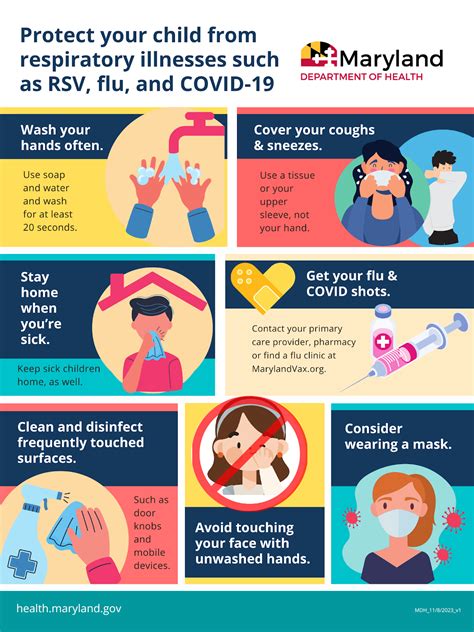Flu Season Guide: Symptoms And Protection

As the winter months approach, the risk of contracting the flu increases, affecting millions of people worldwide. The flu, also known as influenza, is a contagious respiratory illness caused by the influenza virus. It can range from mild to severe and, in some cases, lead to life-threatening complications. Understanding the symptoms of the flu and taking preventive measures are crucial to protecting yourself and your loved ones from this illness.
Identifying Flu Symptoms
The flu shares many symptoms with the common cold, making it challenging to diagnose without a medical test. However, there are distinct signs that can indicate the onset of the flu. These symptoms often develop suddenly and can include:
- High Fever: A temperature of 100°F (37.8°C) or higher, which can last for 3 to 4 days.
- Cough: Can be dry and hacking, or it may produce thick mucus.
- Sore Throat: May be accompanied by a hoarse voice.
- Runny or Stuffy Nose: Similar to a cold, but often less pronounced in adults.
- Headache: Can range from mild to severe and is often described as a dull ache.
- Fatigue: Feeling extremely weak or tired, which can persist even after other symptoms improve.
- Muscle or Body Aches: Can be severe, feeling like a deep ache in the muscles.
- Diarrhea and Vomiting: More common in children than adults.
- Chest Discomfort: Can feel like pressure or tightness in the chest.
Protection Against the Flu
Preventing the flu involves a combination of vaccines, good hygiene practices, and lifestyle adjustments. Here are key strategies to help protect against the flu:
1. Vaccination
The flu vaccine is the most effective way to prevent the flu. It’s recommended for everyone 6 months of age and older, with a few exceptions. The vaccine is updated annually to protect against the most current strains of the flu virus. While it’s most effective when administered before the flu season starts, getting vaccinated later in the season can still offer protection.
2. Practice Good Hygiene
- Wash Your Hands Frequently: Use soap and water for at least 20 seconds, especially after using the toilet, before eating, and after blowing your nose, coughing or sneezing.
- Use Hand Sanitizer: If soap and water are not available, hand sanitizer with at least 60% alcohol can help reduce the spread of Germs.
- Avoid Close Contact with People Who Are Sick: Maintain a distance of at least 6 feet to reduce the chance of getting infected.
3. Lifestyle Adjustments
- Stay Home If You Are Sick: To prevent spreading the flu to others, it’s crucial to stay home from work or school and avoid social gatherings.
- Cover Your Mouth and Nose: When you cough or sneeze, cover your mouth and nose with a tissue or the inside of your elbow to prevent spreading the flu virus.
- Clean and Disinfect: Regularly clean and disinfect surfaces and objects that may be contaminated with the flu virus.
- Stay Healthy: Maintain a healthy lifestyle by getting enough sleep, exercising regularly, managing stress, and ensuring a balanced diet rich in fruits, vegetables, and whole grains.
Complications and High-Risk Groups
While the flu can affect anyone, certain groups are at a higher risk of developing serious complications. These include:
- Older Adults: People 65 years and older
- Young Children: Children under 5 years, especially those under 2
- Pregnant Women
- People with Certain Chronic Health Conditions: Such as heart disease, lung disease, diabetes, and asthma
- People with Weakened Immune Systems: Due to disease or medication (like those with HIV/AIDS, or cancer, or taking chronic steroids)
For these high-risk groups, it’s essential not only to get vaccinated but also to seek medical attention immediately if flu symptoms develop, as antiviral drugs can help treat and prevent serious complications when started promptly.
Treatment Options
If you contract the flu, your healthcare provider may prescribe antiviral drugs. These medications can help make your illness milder and shorten the time you are sick. They may also prevent serious flu complications. It’s essential to start these medications as soon as possible after symptoms appear for maximum effectiveness.
Conclusion
The flu is a serious illness that demands attention and preventive action. By understanding its symptoms, taking preventive measures such as getting vaccinated, practicing good hygiene, and making healthy lifestyle choices, you can significantly reduce your risk of contracting the flu and its complications. Remember, if you or a loved one is in a high-risk group or experiences severe symptoms, seeking medical care immediately is crucial for preventing serious health issues.
What is the best way to prevent the flu?
+The best way to prevent the flu is by getting vaccinated every year. The flu vaccine is updated annually to protect against the most current and prevalent flu viruses.
Who should get a flu vaccine?
+The flu vaccine is recommended for everyone 6 months of age and older, with a few exceptions. It's especially important for people at high risk of developing serious flu complications, such as older adults, young children, pregnant women, and people with certain chronic health conditions.
How long does the flu last?
+The duration of the flu can vary, but most people start to feel better within 2 to 5 days. However, fatigue and weakness can persist for up to 2 weeks or more.
What are antiviral drugs, and do they work against the flu?
+Antiviral drugs are prescription medications that can be used to treat and prevent flu illness. They can help make the illness milder and shorten the time you are sick. They work best when started within 48 hours of flu symptoms appearing.
By being informed and taking proactive steps, you can navigate the flu season with confidence, protecting not only yourself but also contributing to a healthier community.


